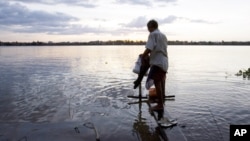PHNOM PENH - Members of a fishing community in Battambang province say overfishing has increased in recent years, fueled in part by collusion between criminals and the authorities responsible for protecting them.
Cambodia is facing a growing crisis from overfishing, as major fish stocks in the Tonle Sap lake are being depleted, diminishing a major source of protein for millions of people.
In Kantrai village, Battambang province, fisherman Lorn Rim said the are “no fish now.”
“Last year, some fish came up here, but this year I’ve seen none,” he said.
Upriver, at the Preak Luong fishing villager, Rim Romduol and other village men have formed regular patrol team to seek out illegal fishermen. He said affluent families downstream have deployed illegal netting operations that stop fish from traveling upstream to communities like his.
On a recent day out on the lake, he and his men rowed their boats away from Kantrai village and into a flooded forest, where they discovered a prohibited type of net, several hundreds of meters in length. They call this net, “norav.”
“These block the fish’s paths, so the fish cannot go upstream, which has affected communities there who use traditional traditional fishing equipment,” he told VOA Khmer.
This kind of netting cannot be accomplished without some kind of help from authorities, he said.
“Nets of this type can cost up to $10,000, so I don’t think the owner of this illegal equipment would dare to risk losing all that money without some kind of collusion with the authorities concerned,” he said.
Not far away, Nin Sokha admitted that the nets belonged to her and her husband, and that she had made payouts to keep them in the water.
“Last year, another group came and wanted to destroy my nets too, but I just gave them money, a couple dozen dollars,” she said. “I don’t not know where they were from or what they did. Only my husband knew them, as he was a soldier.”
Back on the lake, Rim Romduol said he and his team have no authority to confiscate or destroy such netting operations, not without authorization from local fisheries officials. They can only report them, he said.
Officials at the Battambang office for the fisheries administration, under the Ministry of Agriculture, deny taking bribes or working with illegal fishing operations. They said they are cracking down on such activities.
But Rim Romduol said authorities are not doing enough, and he said other communities must get involved by not taking part in corruption and illegal practices. Otherwise, it will be hard to stop overfishing, he said.
“If we love the money of criminals, then it will not be possible,” he said. “Not even with an appeal from the prime minister.”
Cambodia is facing a growing crisis from overfishing, as major fish stocks in the Tonle Sap lake are being depleted, diminishing a major source of protein for millions of people.
In Kantrai village, Battambang province, fisherman Lorn Rim said the are “no fish now.”
“Last year, some fish came up here, but this year I’ve seen none,” he said.
Upriver, at the Preak Luong fishing villager, Rim Romduol and other village men have formed regular patrol team to seek out illegal fishermen. He said affluent families downstream have deployed illegal netting operations that stop fish from traveling upstream to communities like his.
On a recent day out on the lake, he and his men rowed their boats away from Kantrai village and into a flooded forest, where they discovered a prohibited type of net, several hundreds of meters in length. They call this net, “norav.”
“These block the fish’s paths, so the fish cannot go upstream, which has affected communities there who use traditional traditional fishing equipment,” he told VOA Khmer.
This kind of netting cannot be accomplished without some kind of help from authorities, he said.
“Nets of this type can cost up to $10,000, so I don’t think the owner of this illegal equipment would dare to risk losing all that money without some kind of collusion with the authorities concerned,” he said.
Not far away, Nin Sokha admitted that the nets belonged to her and her husband, and that she had made payouts to keep them in the water.
“Last year, another group came and wanted to destroy my nets too, but I just gave them money, a couple dozen dollars,” she said. “I don’t not know where they were from or what they did. Only my husband knew them, as he was a soldier.”
Back on the lake, Rim Romduol said he and his team have no authority to confiscate or destroy such netting operations, not without authorization from local fisheries officials. They can only report them, he said.
Officials at the Battambang office for the fisheries administration, under the Ministry of Agriculture, deny taking bribes or working with illegal fishing operations. They said they are cracking down on such activities.
But Rim Romduol said authorities are not doing enough, and he said other communities must get involved by not taking part in corruption and illegal practices. Otherwise, it will be hard to stop overfishing, he said.
“If we love the money of criminals, then it will not be possible,” he said. “Not even with an appeal from the prime minister.”




